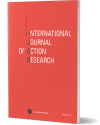Since the beginning of 2022, Miren Larrea has succeeded Danilo Streck as editor-in-chief of our journal IJAR – International Journal of Action Research.
Short vita
 Miren Larrea has a degree in business administration and started her research career with a PhD on local production systems in the Basque Country (Spain). After that, she combined university research with her work in a county development agency, where she explored the potential of research to help solve the challenges of territorial development. With this idea of connecting research and practice in mind, in 2007 she joined Orkestra-Basque Institute of Competitiveness (University of Deusto), where she is a senior researcher. The institute aims at conducting research that will be transformative for the territory and Miren is one of the proponents of action research for territorial development (ARTD) as a methodology that can help reach this aim. Miren coordinates several action research projects with regional policy makers and has extensively published about these experiences and the conceptual frameworks they have inspired. She is also a lecturer in action research at the University of Deusto and the National Technological University (Rafaela, Santa Fé, Argentina).
Miren Larrea has a degree in business administration and started her research career with a PhD on local production systems in the Basque Country (Spain). After that, she combined university research with her work in a county development agency, where she explored the potential of research to help solve the challenges of territorial development. With this idea of connecting research and practice in mind, in 2007 she joined Orkestra-Basque Institute of Competitiveness (University of Deusto), where she is a senior researcher. The institute aims at conducting research that will be transformative for the territory and Miren is one of the proponents of action research for territorial development (ARTD) as a methodology that can help reach this aim. Miren coordinates several action research projects with regional policy makers and has extensively published about these experiences and the conceptual frameworks they have inspired. She is also a lecturer in action research at the University of Deusto and the National Technological University (Rafaela, Santa Fé, Argentina).
We asked Miren five questions about her new position and IJAR.
How did you become the new editor-in-chief?
I had been part of the group of editors of IJAR for a couple of years when Danilo Streck invited me to be the new editor-in-chief. In this period our research institute (Orkestra-Basque Institute of Competitiveness) hosted the IJAR 2020 event. The event was meant to be celebrated face to face in San Sebastian, but due to the pandemic we had to reinvent it as a virtual symposium. We were afraid that this would weaken its relational impact, and to avoid that, we invited participants to join a series of preparatory meetings. The editors of IJAR were involved in these preparatory meetings and that is where I got to know them better and where I develop the sense of being a team.
What are your goals and wishes as the new editor-in-chief?
I believe that action research can make a valuable contribution to solving a series of big emergent challenges that we, citizens of any country or territory, share. Two clear examples are the climate emergency and the digitalization of our works and lives enhancing increasingly radical forms of capitalism. To constructively help face these challenges, action researchers need spaces to be connected, to know about each other and to learn from each other’s experiences. IJAR has been a meeting space for action researchers, and my wish is that we will be able to adapt to the emergent circumstances, to strengthen this community and make the significant contribution that I am sure we can make.
How do you see the future of the journal?
As I said, we will have to evolve to face emergent challenges, but we have also discussed about features of the journal that we want to keep. One of them is a focus on action research conducted at workplace and territorial levels. We are, of course, open to contributions in other fields too, but we believe that the trajectory of IJAR makes this journal a reference point to help the action research discourse evolve in these two fields. Another feature we want to maintain is the relationship style. IJAR has kept a direct mode of relationship between editors and authors that has not been automatized, which would not be feasible if we aimed at publishing a higher number of papers per year. In the near future, I see the journal as a space where this direct dialogue continues happening.
How do you rate the journal’s standing in the scientific community?
I started my research career in the field of regional innovation systems and my publishing experience has been divided in the last years between journals in this field and action research journals. Unfortunately, my experience is that it is more difficult to score high in the traditional indicators used by the scientific community when you write about action research. I tend to think that this is maybe because there are action researchers that read these journals to develop their processes, but not always publish about them afterwards. And when we do publish, we often focus more on the concrete case than in the conceptual discussion, where we would more probably integrate the work of other action researchers. I think this is a challenge that all action research journals share. Of course, I am also aware that there are action research journals that rank higher in impact indicators, but I think IJAR has a recognized space of its own among action research journals and I feel very comfortable with that.
What is your position on open access and would this also be an issue for IJAR in the future?
I think that democratizing knowledge production is at the core of action research and, consequently, we must work to make our papers accessible for any reader. Thus, open access will probably be an issue for IJAR in the future. However, it is a complex issue, as open access in journals is mostly possible now when the authors (or their universities) have the money to use this service. This helps make some research more accessible, but it is the research of those authors who have certain privileges, which creates another type of challenge for the democratization of knowledge production. We will need to be creative to find new solutions.
Copyright Photo: Miren Larrea
 Just published:
Just published:
IJAR – International Journal of Action Research 3-2021
© header image: Sketchify <https://www.canva.com/p/sketchify/>
created with canva.com <https://www.canva.com/>

